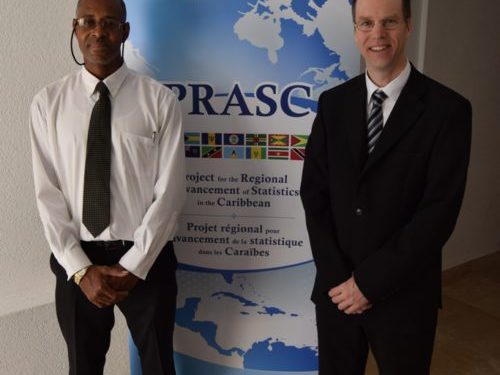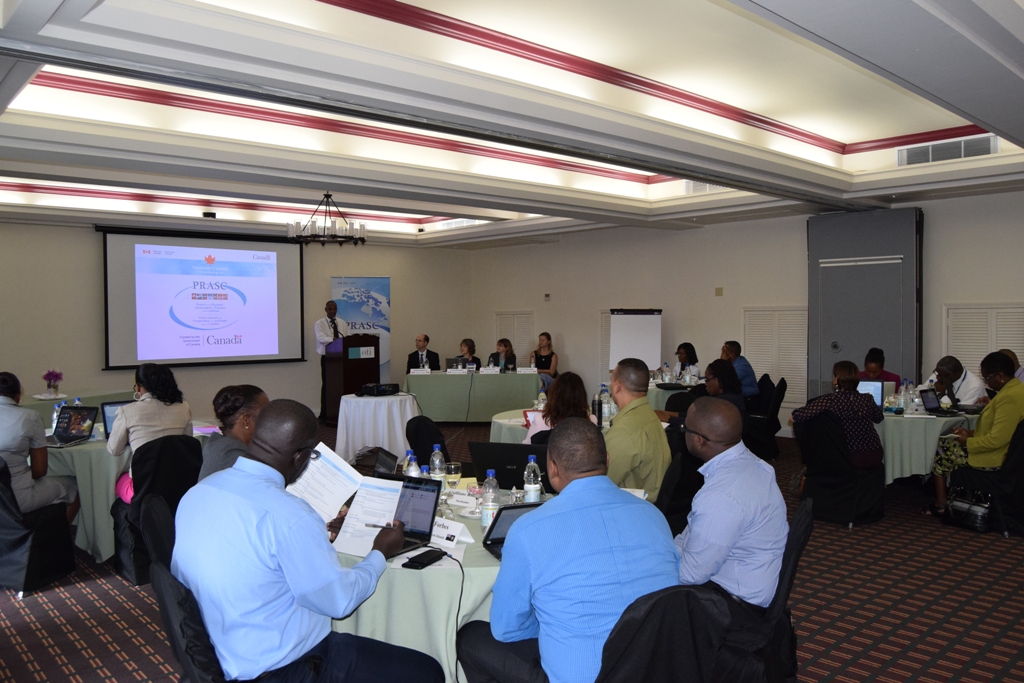The workshop, which runs from Monday, December 05 to Friday, December 09, is facilitated by Statistics Canada, in collaboration with the local Department of Statistics.
The Government of Canada is funding a new statistical capacity building initiative for the Caribbean region, namely, the Project for the Regional Advancement of Statistics in the Caribbean (PRASC). The project, which costs CAD $19.5 million, aims to strengthen the statistical system of the Caribbean in order to improve socio-economic measures and support evidence-based policy making. A number of countries stand to benefit from such project with the monitoring of key developments in the areas of economic growth, poverty, health, education and migration.
Carlton Phipps, Director of Statistics, said that the workshop is extremely important to St. Kitts and Nevis and the region on a whole, noting that meaningful lessons will be taken away for use in various statistics departments in the region.
“This workshop is very important as we seek to advance statistics in the region and within St. Kitts and Nevis,” he said. “The aim or objective behind this is to build credibility and quality statistics, and the framework which we are developing is to strengthen our statistics within the region. I trust that this week-long meeting will be a success, and that our various National Statistics Offices will take away from this meeting valuable approaches and aptitudes that would further enhance the awareness, use and credibility of official statistics.”
Mr. Phipps said that to date statistics in the Caribbean are generally in good standing, thus resulting in a number of achievements such as producing regularly core statistical information on merchandise trade, tourism, consumer price index, national accounts, balance of payments, and socio-demographic indicators – all in line with international standards and regional best practices. He added that some member states have ventured into the production of ICT, gender and environment statistics, and conduct regular household surveys.
“These achievements are in spite of challenges faced by many National Statistics offices across the region – financial and human resource constraints, inadequate response to business surveys and the growing prominence of alternative data sources such as “Big data” and “Open data,” said Mr. Phipps. “However, despite our achievements, we must, as Statisticians, continue to ensure the quality of our statistics. This is why we are here this week to develop the mechanism that would ensure that the statistics we produce earn the stamp of approval for credibility and of a high quality.”
Roland Boudreau, Director, Economic Statistics Division at Statistics Canada, explained his institutions role in the project, noting that they are indeed grateful to be able to facilitate the workshop for the region, as it is their role to facilitate the building up of the framework.
“The idea here is really to try and bring together the experience of all the countries, share this experience and try and come up with their original perspective on the Quality Assurance Framework,” said Mr. Boudreau. “Really what we are looking at is to come up with a good draft document of the Quality Assurance Framework, which then will be reviewed and validated by member countries and the CARICOM. So that is up to the region to bring it to the final version of the document.”
The project will focus on four components to enhance the systems of National Accounts; improve business statistics by working on a robust business survey infrastructure; improve household statistics, including sex-disaggregated socio-economic indicators by working on a robust survey infrastructure for household surveys; and improve sharing of statistical information and expertise at the national and regional levels.
Countries represented at the week-long workshop are Antigua and Barbuda, Bahamas, Barbados, Belize, Bermuda, British Virgin Islands, Curaçao, Dominica, Grenada, Guyana, Jamaica, Sint Maarten, St. Lucia, St. Kitts and Nevis, St. Vincent and the Grenadines, Suriname, Trinidad and Tobago and Turks and Caicos Islands.













